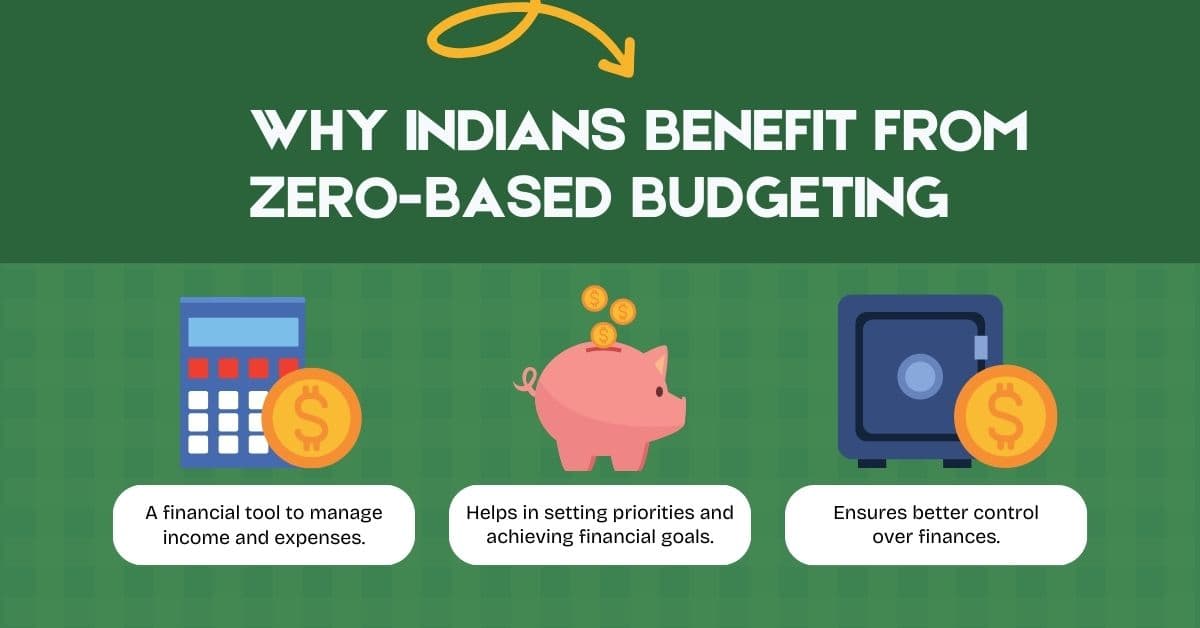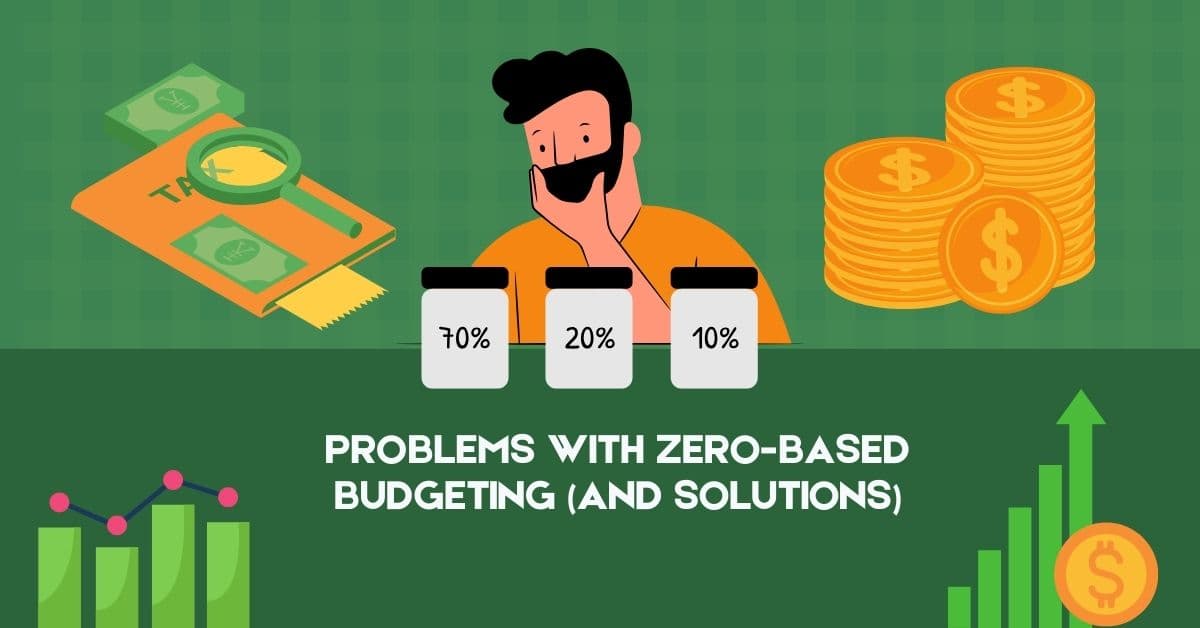Zero-Based Budgeting: In India, where growing living costs, inflation, and financial goals sometimes intersect, efficient money management is more important than ever. Whether you are a paid professional in Mumbai, a small company owner in Delhi, or a housewife in Chennai, obtaining financial freedom requires a sound strategy. Enter Zero-Based Budgeting (ZBB), a simple yet effective budgeting strategy that is gaining popularity among Indians looking to get control over their finances.

ZBB guarantees that every rupee you make has a purpose, in contrast to traditional budgeting, which frequently allows for overspending or ambiguous savings objectives. It opens the door to financial independence and transparency by balancing your income with your savings and spending. We’ll go over the definition, operation, and reasons why zero-based budgeting is revolutionary for Indian homes in this beginner’s tutorial. Additionally, we’ll offer helpful advice, examples, and methods to get you started on the path to financial independence in 2025!
How Does Zero-Based Budgeting Work?
When you use zero-based budgeting, you set aside every rupee of your income for investments, savings, or spending until your budget is zero. ZBB begins every month from scratch, as contrast to typical budgeting, which may involve deducting costs from income and saving “whatever’s left.” You give each rupee a task to do, making sure nothing gets lost.
- The basic idea is that income less expenses equals zero.
- For instance, if you make ₹50,000 a month, you meticulously plan how to spend, save, or invest that entire amount—no guessing, no leftovers.
- Indian Context: ZBB assists in putting necessities ahead of wants in light of growing expenses (such as food, rent, and EMIs) and cultural constraints (such as holidays and familial responsibilities).
Why Indians Benefit from Zero-Based Budgeting
Financial planning is challenging in India because of the country’s diversified economy, which includes both rural farmers and urban IT workers. ZBB is a great fit for the following reasons:

- Addresses Inflation: According to RBI projections, inflation will be between 4 and 6% in 2025, which would result in ongoing price increases for necessities like food and gasoline. ZBB compels you to make proactive expenditure adjustments.
- Handles Varying Income: In India, small company owners, gig workers, and freelancers frequently deal with varying incomes. Any income level may be accommodated by ZBB.
- Supports Financial Goals: ZBB makes sure that every goal is financed, whether it’s purchasing a property in Bangalore, paying for a child’s schooling, or organising a Diwali party.
- Minimises Waste: ZBB encourages self-control and intentionality in a society where “saving face” can result in excessive expenditure.
The Differences Between Traditional and Zero-Based Budgeting
Two different strategies for handling money are traditional budgeting and zero-based budgeting. Conventional budgeting is a simple process in which income is collected, costs are deducted, and any money left over is usually kept or spent without a formal plan. Its main goal is to prevent overspending and is frequently strict, depending on prior spending patterns. For instance, in India, a person may spend ₹10,000 that remains after paying bills on shopping or eating out without having a precise budget in mind.
Zero-based budgeting, on the other hand, adopts a more deliberate strategy by giving each rupee a specific purpose until the budget hits zero. This approach is more adaptable and goal-oriented because it resets once a month. Every rupee is set aside for investments, savings, or expenses rather than being allowed to be spent carelessly. To ensure improved financial discipline and long-term wealth development, 10,000, for example, might be purposefully put into an emergency fund or Systematic Investment Plan (SIP) after all necessary expenses have been paid.
ZBB’s proactive approach makes it the perfect choice for Indians who are balancing investments, family assistance, and EMIs.
A Comprehensive Guide to Zero-Based Budgeting
Are you prepared to take charge of your money? Here’s how a novice in India may apply ZBB:
Step 1: Determine Your Monthly Income Total
- Add all of your sources, including your salary, side jobs, freelance work, and rental income.
- For instance, a software engineer in Pune makes ₹80,000 (salary of ₹70,000) plus ₹10,000 (freelance).
Step 2: Make a list of your costs
Sort them into two groups: variable (groceries, entertainment) and fixed (rent, EMIs).
Indian Illustration:
- ₹20,000 for rent
- ₹8,000 for groceries
- ₹2,000 for electricity
- Transportation: 5,000
- ₹3,000 for eating out
Step 3: Establish Budgetary Objectives
Set aside money for debt repayment, investments, or savings.
Indian Objectives:
- ₹5,000 for an emergency fund
- Retirement SIP: ₹10,000
- ₹7,000 for the child’s education fund
Step 4: Give Each Rupee a Task
Deduct your objectives and costs from your income until you reach zero.
An example budget of ₹80,000:
- ₹20,000 for rent
- ₹8,000 for groceries
- ₹2,000 for electricity
- Transportation: 5,000
- ₹3,000 for eating out
- ₹5,000 for an emergency fund
- SIP: 10,000 naira
- Fund for Education: ₹7,000
- Festival discounts (like those for Diwali): ₹5,000
- Unrelated: ₹5,000
- ₹80,000 minus ₹80,000 equals ₹0.
Step 5: Monitor and Modify Every month
- To keep tabs on your expenses, use tools like Google Sheets or Walnut.
- To get your spending back to zero, cut back in one area (like groceries) if you overspend in another (like eating out).
An Indian Family’s Example of Zero-Based Budgeting
Let’s apply ZBB to a Hyderabad middle-class family that makes ₹1 lakh a month:
Income: ₹1,00,000 (wife’s part-time job: ₹30,000 + husband’s salary: ₹70,000)
Costs and Objectives:
- ₹25,000 for rent
- ₹10,000 for groceries
- ₹5,000 for utilities (water, electricity, and internet).
- Transportation (gas, underground): 8,000
- Monthly tuition: ₹10,000
- 2,000 for entertainment (movies, OTT)
- ₹5,000 for an emergency fund
- Mutual Fund SIP: 15,000.
- ₹10,000 is the debt repayment for the bike loan.
- Sankranti and other festival savings: ₹5,000
- Unrelated: ₹5,000
- The sum is ₹1,00,000 minus ₹1,00,000 equals ₹0.
This family balances long-term objectives like retirement and school with everyday necessities, making sure every penny is tracked down.
Zero-Based Budgeting's Advantages for Indians
- Control and Clarity: You don’t have to wonder why savings are low since you know precisely where your money is going.
- Reducing Debt: Set aside additional rupees to pay off high-interest debts, such as credit card debt, which has an annual percentage rate of 36%.
- Reaching the Goal: Finance major Indian aspirations stress-free, such as purchasing a home, a vehicle, or a dream getaway.
- Adjusts to Lifestyle: ZBB adapts to your requirements, whether you’re a combined family in Kolkata or a single millennial in Gurugram.
Problems with Zero-Based Budgeting (and Solutions)
Time-consuming First of all:

Solution: Begin by using a basic spreadsheet or budgeting application such as YNAB (You Need A Budget) or Moneycontrol.
Unpredictable Income:
Fix: Treat additional earnings as a bonus for saving, and base your budget on the lowest anticipated income (for example, ₹40,000 for a freelancer).
Expenses Unexpected:
Answer: Create a ₹5,000–10,000 emergency fund to cover unforeseen expenses like repairs or medical costs.
Indians' Apps for Zero-Based Budgeting Tools:
- Apps: ET Money, Money View, or Walnut—integrate bank accounts and keep tabs on spending.
- Spreadsheets: Look for “zero-based budget India” to find free Google Sheets templates for ZBB.
- Manual Method: For novices, record income and spending in a notepad.
The Reasons ZBB Promotes Financial Independence
Having enough investments, savings, and passive income to live your life as you see fit is the definition of financial independence. For Indians, this might entail helping elderly parents, paying for a child’s IIT education, or retiring early in Goa. ZBB speeds up this process by:
- Reducing Waste: No more impulsive Zomato orders or unanticipated Amazon sales purchases.
- Increasing Savings: Transfer money to gold, FDs, or SIPs—all of which are well-liked Indian investment choices.
- Developing Discipline: Making deliberate purchases as a habit helps you get ready for more significant financial decisions.
Impact on Real Life: ZBB helped a 30-year-old Bengaluru resident who makes ₹60,000 a month save ₹15,000. He started a ₹10,000 SIP and accumulated a ₹5 lakh emergency fund in 3 years, which were the first steps towards purchasing a property.
Advice for India's Zero-Based Budgeting Success
Start Small: Start with ₹10,000 and work your way up if ₹50,000 seems too much.
Engage the Family: Align your parents or spouse with your objectives, such as reducing cable to save money on OTT.
Make Festival Plans: Set aside ₹5,000 to ₹10,000 for Eid or Diwali to prevent going over budget.
Review Every Month: Make adjustments for new objectives or growing expenses (such as gasoline prices in 2025).
Celebrate your victories: Give yourself ₹1,000 as a reward for staying inside your spending plan; this creates momentum.
Common Errors to Steer Clear of:
- Overcomplication Don’t make fifty categories; only ten or fifteen.
- Ignoring Minor Costs: Keep track of the ₹1,500 monthly total that comes from ₹50 worth of chai every day!
- Absence of an emergency buffer: Without a buffer, unforeseen expenses cause your budget to go awry.
A Case Study on Zero-Based Budgeting in the Indian Setting
Introducing Rahul, a 28-year-old Ahmedabad teacher who makes ₹40,000 a month. He saved sparingly before to ZBB, frequently using her ₹50,000 funds for exigencies or celebrations. Her ZBB strategy is as follows:
- Revenue: ₹40,000
- Budget: ₹12,000 for rent
- ₹6,000 for groceries
- Transportation: 3,000
- ₹2,000 for utilities
- ₹1,000 for entertainment
- ₹3,000 for an emergency fund
- SIP: ₹5,000
- Education loan debt: ₹5,000
- Unspecified: ₹3,000
As a result, Rahul made a significant stride towards financial independence after six months by saving ₹18,000 and investing ₹30,000 in mutual funds.
Conclusion, this is where your journey to financial independence begins
Zero-based budgeting is a way of thinking, not merely a method of creating a budget. ZBB provides Indians with a clear path to financial independence as they manage growing expenses, family obligations, and aspirational goals. Giving each rupee a purpose can help you pay off debt, accumulate money, and enjoy your life as you see fit, whether that means safeguarding your family’s future, retiring early, or visiting the Himalayas.
Begin with your upcoming pay cheque now. To customise ZBB for your life, purchase a notebook, use a budgeting software, or speak with a financial adviser. Zero-based budgeting guarantees that no rupee is wasted in a nation where every penny matters. Your financial independence is waiting for you if you take the first step!
Budgeting Tips for Single-Income Families: Manage Finances Smartly
Budgeting vs Forecasting: Unlocking Financial Clarity & Control
